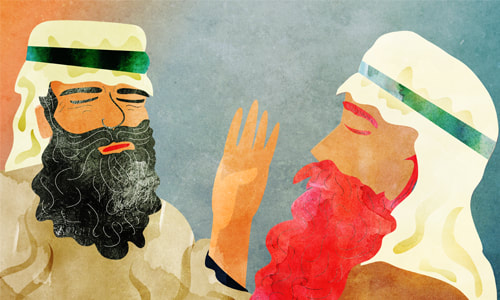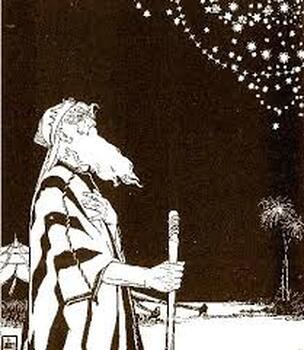 Rabbi David Etengoff Dedicated to the sacred memories of my mother, Miriam Tovah bat Aharon Hakohen, father-in-law, Levi ben Yitzhak, sister-in-law, Ruchama Rivka Sondra bat Yechiel, sister, Shulamit bat Menachem, Chana bat Shmuel, Yehonatan Binyamin ben Mordechai Meir Halevi, Shoshana Elka bat Avraham, Tikvah bat Rivka Perel, Peretz ben Chaim, Chaya Sarah bat Reb Yechezkel Shraga, the Kedoshim of Har Nof and Pittsburgh, and the refuah shlaimah of Mordechai HaLevi ben Miriam Tovah, Moshe ben Itta Golda, Yocheved Dafneh bat Dinah Zehavah, Reuven Shmuel ben Leah and the safety of our brothers and sisters in Israel and around the world. In many ways, Parashat Toldot can be thought of as “the parasha of brachot,” since both Ya’akov and Eisav received blessings from their father Yitzchak. While Ya’akov’s first blessing was initially designed and designated for Eisav, his second one was specifically formulated for him. In contrast, Eisav received only one bracha. Yet, on a certain level we can readily ask, “Why was Eisav given a bracha at all?” After all, juxtaposed to Yitzchak’s announcement to Eisav that he was prepared to give him his blessing, the Torah informs us that Eisav married two Hittite women, Yehudit bat B’ari and Bashmat bat Alon. These women were a complete “vexation of the spirit to Yitzchak and to Rivka” since, as Rashi (1040-1105) explains, “they worshipped idols.” (Sefer Bereishit 26:35, Bible and Rashi translations, The Judaica Press Complete Tanach) A number of meforshim (Torah commentators) wrestled with our question and gave a variety of answers. In my estimation, Rabbi Chayim ben Moshe ibn Attar (1696-1743) offers one of the clearest responses: The reason why Yitzchak desired to bestow a bracha upon the evil Eisav was because he thought that as a result of the many blessings contained therein, he would alter his behavior and acquire positive ethical characteristics and, thereby, improve his actions. This is the case, since the tzaddikim suffer greatly when their children act in an evil manner; as such, he [Yitzchak] tried to bring him [Eisav] to improve his ways. In addition, it is entirely possible that this could have succeeded, for as our sages teach us, Ya’akov was punished for withholding Dinah from Eisav, since she would have had the ability to bring him back to all that is good… (Sefer Ohr HaChayim, Parashat Bereishit 27:1, translation my own) In sum, according to Rav Attar, Yitzchak sought to bless Eisav for two reasons: To alleviate his own pain and suffering, and to help his eldest son do teshuvah and return to the path of proper behavior. Unfortunately, neither of these potentialities were achieved, and Eisav’s anti-Semitic descendants ceaselessly plague us today. As Rabbi Shimon bar Yochai so poignantly taught us: “It is a well-known fact that Eisav hates Jacob…” (Sifrei Bamidbar 69) In 1732, the British poet, Alexander Pope, coined the now proverbial phrase, “Hope springs eternal...” (An Essay on Man) While this is true for humankind in general, it is particularly true for the Jewish people. We steadfastly hope for a nobler and gentler tomorrow wherein all people will recognize the truth of Hashem’s existence, accept His kingship, turn toward Him, reject false idols and stand shoulder to shoulder to create an equitable world for one and all. In short, as we recite in the second paragraph of the Aleinu: And so, we hope in You, Hashem our G-d, to soon see Your splendor when You will sweep idolatry away so that false gods will be utterly destroyed and You will perfect the world through Your kingship. Then, all humanity will invoke Your name, and all the evil ones of the earth will turn unto You. Then all who live will know that unto You every knee must bend, every tongue pledge loyalty. May all bow in worship to You, Hashem. May they give honor to Your glory; may everyone accept Your dominion. Reign over all, soon and for all time. Kingship is Yours in glory, now and forever. As it is written in Your Torah: “Hashem reigns for ever and ever.” And so, too, does it state: “And Hashem will become King over all the earth; on that day Hashem will be one, and His name one.” (Translation, Sefaria.org with my extensive emendations) With Hashem’s help and our fervent desire, may we witness the realization of Zechariah’s stirring words soon and in our time: “And Hashem will become King over all the earth; on that day Hashem will be one, and His name one.” (14:9) V’chane yihi ratzon. Shabbat Shalom Past drashot may be found at my blog-website: http://reparashathashavuah.org They may also be found on http://www.yutorah.org using the search criteria Etengoff and the parasha’s name. The email list, b’chasdei Hashem, has expanded to hundreds of people. I am always happy to add more members to the list. If you have family or friends you would like to have added, please do not hesitate to contact me via email mailto:[email protected]. *** My audio shiurim for Women on the topics of Tefilah and Tanach may be found at: http://tinyurl.com/8hsdpyd *** I have posted 164 of Rabbi Soloveitchik’s English language audio shiurim (MP3 format) spanning the years 1958-1984. Please click on the highlighted link.
0 Comments
 Rabbi David Etengoff Dedicated to the sacred memories of my mother, Miriam Tovah bat Aharon Hakohen, father-in-law, Levi ben Yitzhak, sister-in-law, Ruchama Rivka Sondra bat Yechiel, sister, Shulamit bat Menachem, Chana bat Shmuel, Yehonatan Binyamin ben Mordechai Meir Halevi, Shoshana Elka bat Avraham, Tikvah bat Rivka Perel, Peretz ben Chaim, Chaya Sarah bat Reb Yechezkel Shraga, the Kedoshim of Har Nof and Pittsburgh, and the refuah shlaimah of Mordechai HaLevi ben Miriam Tovah, Moshe ben Itta Golda, Yocheved Dafneh bat Dinah Zehavah, Reuven Shmuel ben Leah and the safety of our brothers and sisters in Israel and around the world. The concluding section of our parasha presents the first narrative of the Yitzchak and Rivka story. In the midst of these pasukim, we encounter a verse that conceals far more than it reveals: “Isaac went out lasuach ba’sadeh lifnot erev — to meditate in the field toward evening. He raised his eyes, and saw camels approaching.” (Sefer Bereishit 24:63, translation, The Living Torah, Rav Aryeh Kaplan zatzal) We are immediately struck by the phrase, “lasuach ba’sadeh lifnot erev,” as its meaning is quite obscure. Fortunately, Talmud Bavli, Berachot 26b explains it in the following manner: “It has been taught in accordance with R. Jose b. Hanina, ...Isaac instituted the afternoon prayer, as it says, ‘Isaac went out to meditate in the field toward evening,’ and “meditation” — lasuach — means only prayer...’” (Translation with my emendations, The Soncino Talmud) Rashi (1040-1105) embraces the Talmud’s analysis of lasuach, and interprets the beginning of our pasuk as, “And Isaac went forth to pray in the field towards evening.” (Translation, The Judaica Press Complete Tanach) The Chasidic master, Rabbi Ya’akov Yoseph of Polonne zatzal (1710-1784), follows Rashi’s lead regarding lasuach and connects it directly to the words, “lifnot erev.” In addition, he looks beyond the straightforward meaning of lifnot erev (toward evening), and suggests a kabbalisticaly-infused interpretation of the term: Prior to praying, Yitzchak was punctilious in his efforts to remove and distance himself from all manner of “erev.” Erev refers to negative and extraneous thoughts [that can prevent a person from being able to pray effectively and meaningfully]. Yitzchak achieved this to the point that his prayer was as pure as Heaven itself and reached the highest level of utmost purity. (Toldot Ya’akov Yoseph, Sefer Bereishit, Parashat Vayishlach, s.v. v'nireh li b’biur, translation my own) Rabbi Ya’akov Yoseph’s statement regarding the purity Yitzchak achieved in his tefilah is highly reminiscent of a crucial formulation in the Iggeret HaRamban, wherein the Ramban (1194-1270) discusses the notion of removing “negative and extraneous thoughts” in order to achieve a meaningful prayer experience: “Remove all worldly concerns from your mind during prayer. Prepare your mind before the Omnipresent One, may He be blessed, purify your thoughts and deeply focus upon about the words [of prayer] before you utter them.” (Translation my own) The message from our sources is clear: Taharut b’tefilah — purity in prayer — requires hachanah l’tefilah — preparation for prayer. In particular, the Ramban teaches us three steps of hachanah l’tefilah that will enable us to approach the level of taharut b’tefilah:
The first step in preparing our minds to stand before the Almighty prior to embarking upon the prayer experience is given voice in a phrase found above many an aron kodesh, “Da lifnei Mi atah omeid — Know before Whom you stand.” In other words, we must have a powerful sense that we are in the presence of the Almighty when we attempt to encounter Him during tefilah. Next, we must do everything in our power to “remove all worldly concerns from our minds during prayer” in order to purify our thoughts and prepare ourselves to engage the Almighty. While this is surely a difficult task, the reward is equal to the effort. Finally, we need to understand the words that we are about to say to Hashem in order to focus upon them and pray with kavavah — intention; for only then will they convey our deepest and innermost thoughts to our Creator. With Hashem’s help and our most fervent desire, may our tefilot ever ascend to the kisa hakavode — Throne of Glory, and may they be answered b’chane v’chesed u’b’rachamim — with favor, kindness and mercy. V’chane yihi ratzon. Shabbat Shalom Past drashot may be found at my blog-website: http://reparashathashavuah.org They may also be found on http://www.yutorah.org using the search criteria Etengoff and the parasha’s name. The email list, b’chasdei Hashem, has expanded to hundreds of people. I am always happy to add more members to the list. If you have family or friends you would like to have added, please do not hesitate to contact me via email mailto:[email protected]. *** My audio shiurim for Women on the topics of Tefilah and Tanach may be found at: http://tinyurl.com/8hsdpyd *** I have posted 164 of Rabbi Soloveitchik’s English language audio shiurim (MP3 format) spanning the years 1958-1984. Please click on the highlighted link.  Rabbi David Etengoff Dedicated to the sacred memories of my mother, Miriam Tovah bat Aharon Hakohen, father-in-law, Levi ben Yitzhak, sister-in-law, Ruchama Rivka Sondra bat Yechiel, sister, Shulamit bat Menachem, Chana bat Shmuel, Yehonatan Binyamin ben Mordechai Meir Halevi, Shoshana Elka bat Avraham, Tikvah bat Rivka Perel, Peretz ben Chaim, Chaya Sarah bat Reb Yechezkel Shraga, the Kedoshim of Har Nof and Pittsburgh, and the refuah shlaimah of Mordechai HaLevi ben Miriam Tovah, Moshe ben Itta Golda, Yocheved Dafneh bat Dinah Zehavah, Reuven Shmuel ben Leah and the safety of our brothers and sisters in Israel and around the world. One of the many challenging verses in our parasha concerns the nature of Yishmael’s behavior at the moment he is about to die of thirst: “And G-d heard kol ha’na’ar (the lad’s voice), and an angel of G-d called to Hagar from heaven, and said to her, ‘What is troubling you, Hagar? Fear not, for G-d has heard kol ha’na’ar (the lad’s voice) ba’asher hu sham (in the place where he is).’” (Sefer Beresihit 21:17, this and all Tanach and Rashi translations, The Judaica Press Complete Tanach) The two terms, “kol ha’na’ar” and “ba’asher hu sham,” are very difficult to understand, since their meaning is elusive. Does kol ha’na’ar refer to Yishmael’s voice, his cry, or something else entirely? Then, too, ba’asher hu sham seems superfluous on every level, for after all, where else would Hashem have heard Yismael other than the “place where he is?” Chapter 30 of Midrash Pirkei d’ Rabi Eliezer, contextualizes and, in so doing, interprets the phrase, “kol ha’na’ar” through the use of the following narrative: Yishmael’s very being was exhausted from thirst, and that point, he went and he threw himself under one of the desert bushes. [At that moment he] said: “Master of all worlds! If You have the desire to give me water to drink, give me water to drink and do not allow my soul to depart from me as a result of the extreme thirst I am suffering; for death from thirst is different from and more difficult than all other forms of death!” And the Holy One blessed be He heard his tefilah, as the texts states: “And G-d heard kol ha’na’ar.” (Translation my own) According to this midrash, “kol ha’na’ar” clearly refers to the heartfelt tefilah Yishmael uttered at this moment of mortal danger. If this is the case, the midrash is teaching us something universally applicable, namely, Yishmael’s personal prayer experience, and its positive outcome, is available to everyone. This idea was given powerful voice by David HaMelech when he famously declared, “Hashem is near to all who call Him, to all who call upon Him with truth.” (Sefer Tehillim 145:18) At first glance, ba’asher hu sham does not seem connected to kol ha’na’ar and, as suggested earlier, appears completely unnecessary. If so, why does our verse include this phrase? Perhaps this question is one of the reasons Rashi (1040-1105) suggests the following interpretation: Where he is: According to the deeds that he does now he is judged and not according to what he is destined to do (Talmud Bavli, Rosh Hashanah 16b). For the ministering angels acted as accusers and said: “O’ L-rd of the Universe, for one [that is, Yishmael’s descendants] who is destined to kill Your children with thirst, You are bringing up a well?!” And He answered them, “What is he now, righteous or wicked?” They replied, “Righteous.” He said to them, “According to his present deeds I judge him” (Midrash Bereishit Rabbah 53:14). And that is the meaning of “where he is.” In one deft stroke, Rashi’s midrashically-infused analysis teaches us that ba’asher hu sham does not refer to a physical location; rather, it is a description of Yishmael’s existential state at the moment of uttering his tefilah to the Almighty. As such, kol ha’na’ar and ba’asher hu sham are actually closely intertwined, and each advances the understanding of the other. Knowing that Hashem judges us according to our present deeds, instead of any future missteps we may take, inspires us with a sense of security and suggests that we are able to honor and serve Him through our actions. As Shlomo HaMelech taught us some 3,000 years ago: “The end of the matter, everything having been heard, treat G-d with awe and keep His commandments, for this is the ultimate purpose of man.” (Sefer Kohelet 12:13) May we then be zoche (merit) to be in a place where Hashem will be willing to hear, and answer, our tefilot. As we say three times each day in the Shemoneh Esrai: “Hear our voice, Hashem our G-d, pity and be compassionate to us, and accept – with compassion and favor – our prayer, for You are G-d Who hears prayers and supplications…” (Translation, The Artscroll Siddur) V’chane yihi ratzon. Shabbat Shalom Past drashot may be found at my blog-website: http://reparashathashavuah.org They may also be found on http://www.yutorah.org using the search criteria Etengoff and the parasha’s name. The email list, b’chasdei Hashem, has expanded to hundreds of people. I am always happy to add more members to the list. If you have family or friends you would like to have added, please do not hesitate to contact me via email mailto:[email protected]. *** My audio shiurim for Women on the topics of Tefilah and Tanach may be found at: http://tinyurl.com/8hsdpyd *** I have posted 164 of Rabbi Soloveitchik’s English language audio shiurim (MP3 format) spanning the years 1958-1984. Please click on the highlighted link.  Rabbi David Etengoff Dedicated to the sacred memories of my mother, Miriam Tovah bat Aharon Hakohen, father-in-law, Levi ben Yitzhak, sister-in-law, Ruchama Rivka Sondra bat Yechiel, sister, Shulamit bat Menachem, Chana bat Shmuel, Yehonatan Binyamin ben Mordechai Meir Halevi, Shoshana Elka bat Avraham, Tikvah bat Rivka Perel, Peretz ben Chaim, Chaya Sarah bat Reb Yechezkel Shraga, the Kedoshim of Har Nof and Pittsburgh, and the refuah shlaimah of Mordechai HaLevi ben Miriam Tovah, Moshe ben Itta Golda, Yocheved Dafneh bat Dinah Zehavah, Reuven Shmuel ben Leah and the safety of our brothers and sisters in Israel and around the world. Our parasha begins the narrative of Avraham Avinu (our father Abraham). It is a grand story that resonates until our own historical moment, for without Avraham there never would have been a Jewish people. My rebbe and mentor, Rabbi Joseph B. Soloveitchik zatzal (1903-1993), known as “the Rav” by his students and followers, describes our founding father’s remarkable import in this manner: Abraham left such an indelible imprint upon our unfolding historic destiny that he has been integrated into our historical consciousness; he is so singular a motif of our historical emergence that the whole paradoxical, complex experience of our charisma would be impossible if we denied the reality of the Abraham-personality. The narrative about his life...activates our great historical experience and lends it meaning and worth. (Abraham’s Journey: Reflections on the Life of the Founding Patriarch, page 3) How did Avraham attain his status as the progenitor of our people? Part of the answer is found in his willingness to reject the ubiquitous avodah zarah (idol worship) of his time, his drive to discover the Almighty and his passion to bring others under G-d’s divine protection. The Rambam (Maimonides, 1135-1204) discusses this in the first chapter of Mishneh Torah, Hilchot Avodat Kochavim: His [that is, Abraham’s] father, mother, and all the people [around him] were idol worshipers, and he would worship with them. [However,] his heart was exploring and [gaining] understanding. Ultimately, he appreciated the way of truth and understood the path of righteousness through his accurate comprehension. He realized that there was one G-d who controlled the sphere, that He created everything, and that there is no other G-d among all the other entities. He knew that the entire world was making a mistake. What caused them to err was their service of the stars and images, which made them lose awareness of the truth. (Halacha 3, translation, Rabbi Eliyahu Touger) At this juncture, the Rambam describes Avraham’s quest to bring monotheism to the world: Abraham was forty years old when he became aware of his Creator. When he recognized and knew Him, he began to formulate replies to the inhabitants of Ur Kasdim and debate with them, telling them that they were not following a proper path. He broke their idols and began to teach the people that it is fitting to serve only the G-d of the world. To Him [alone] is it fitting to bow down, sacrifice, and offer libations, so that the people of future [generations] would recognize Him....[Then, in Charan] he began to call in a loud voice to all people and inform them that there is one G-d in the entire world and it is proper to serve Him. He would go out and call to the people, gathering them in city after city and country after country, until he came to the land of Canaan – where he proclaimed [G-d’s existence the entire time]. Avraham was the world’s first exponent of monotheism and an authentic religious revolutionary. He repudiated the cultural and religious values of his time, and dared to proclaim that polytheism was categorically false and devoid of all value and meaning. This heroic gesture took consummate belief, as well as endless courage and determination. Truly, as the Danish philosopher Soren Kierkegaard (1813-1855) once declared, Avraham Avinu was the ultimate “Knight of Faith.” Avraham’s entrance onto the grand stage of world history was a tremendous comfort to Hashem, as he was the first person to acknowledge, love and worship Him in heartfelt devotion. Little wonder, then, that he is the sole individual in Tanach to receive the dual appellations, “avdi” (Avraham My servant, Sefer Bereishit 26:24) and “ohavi” (Avraham My beloved friend, Sefer Yeshiyahu 41:8). Rashi (1040-1105), in his Commentary on Sefer Yeshiyahu, explains ohavi in a manner that parallels the Rambam’s thoughts in Hilchot Avodat Kochavim: “For he did not recognize Me as a result of rebuke (tochacha), nor as a result of having been educated by his forebears to do so. Instead, he did this purely out of love.” (Translation my own) On measure, Avraham Avinu ever remains our model and inspiration for developing and expanding our role as the Jewish people. As the Lubavitcher rebbe (Rabbi Menachem Mendel Schneerson zatzal, 1902-1994) said: Avraham Avinu gave us as a nation, and as individuals, the ability to bring light to the world and to begin everything anew. Because of Avraham, we have nothing whatsoever to fear as we go forth into the world with our torch [Torah and truth]. Beyond a doubt, [our task] is to enlighten the world and to bestir the hearts [and minds of all humankind]. (Summary of Sichot for the first night of Succot, Rabbi Shmuel Riskin, translation and brackets my own) With Hashem’s help and our heartfelt desire, may each of us, in our own unique way, strive to be like Avraham Avinu and bring the light of Torah and truth to the world. V’chane yihi ratzon. Shabbat Shalom Past drashot may be found at my blog-website: http://reparashathashavuah.org They may also be found on http://www.yutorah.org using the search criteria Etengoff and the parasha’s name. The email list, b’chasdei Hashem, has expanded to hundreds of people. I am always happy to add more members to the list. If you have family or friends you would like to have added, please do not hesitate to contact me via email mailto:[email protected]. *** My audio shiurim for Women on the topics of Tefilah and Tanach may be found at: http://tinyurl.com/8hsdpyd *** I have posted 164 of Rabbi Soloveitchik’s English language audio shiurim (MP3 format) spanning the years 1958-1984. Please click on the highlighted link. |
Details
Archives
July 2024
AuthorTalmid of Rabbi Soloveitchik zatzal Categories |
- Blog: Rabbi David Etengoff: Parashat HaShavuah
- Sefer Bereishit 5784&5785
- Sefer Shemot 5784&5785
- Sefer Vayikra 5784&5785
- Sefer Bamidbar 5784 &5785
- Sefer Bereishit 5782&5783
- Sefer Shemot 5782&5783
- Sefer Vayikra 5782&5783
- Sefer Bamidbar 5782&5783
- Sefer Devarim 5782&5783
- Sefer Bereishit 5780& 5781
- Sefer Shemot 5780&5781
- Sefer Vayikra 5780&5781
- Sefer Bamidbar 578&5781
- Sefer Devarim 578&5781
- Sefer Bereishit 5778&5779
- Sefer Shemot 5778&5779
- Sefer Vayikra 5778&5779
- Sefer Bamidbar 5778&5779
- Sefer Devarim 5778&5779
- Sefer Bereishit 5776&5777
- Sefer Bereishit 5774&5775
- Sefer Bereishit 5772&5773
- Sefer Bereishit 5771&5770
- Sefer Shemot 5776&5777
- Sefer Shemot 5774&5775
- Sefer Shemot 5772&5773
- Sefer Shemot 5771&5770
- Sefer Vayikra 5776&5777
- Sefer Vayikra 5774&5775
- Sefer Vayikra 5772&5773
- Sefer Vayikra 5771&5770
- Sefer Bamidbar 5776&5777
- Sefer Bamidbar 5774&5775
- Sefer Bamidbar 5772&5773
- Sefer Bamidbar 5771&5770
- Sefer Devarim 5776&5777
- Sefer Devarim 5774&5775
- Sefer Devarim 5772&5773
- Sefer Devarim 5771&5770
 RSS Feed
RSS Feed
